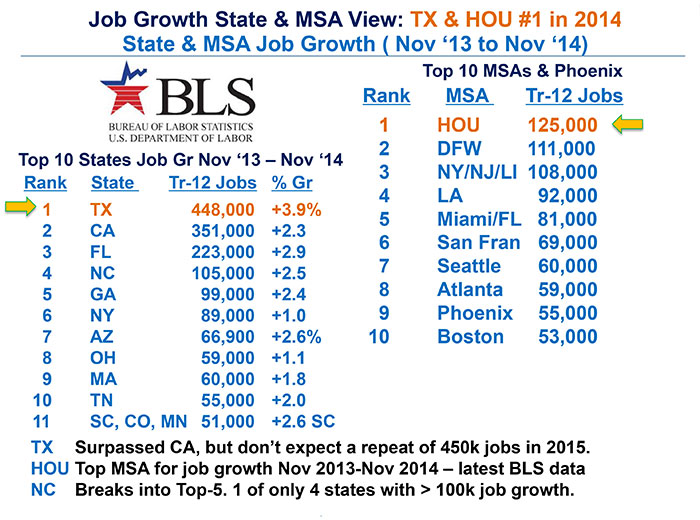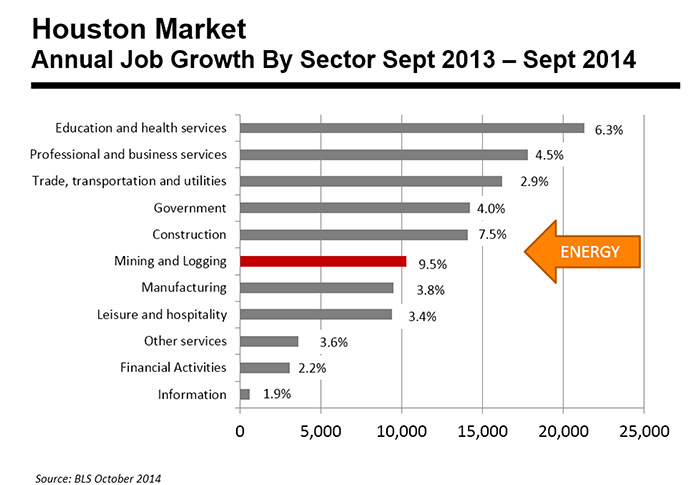Houston seemed to be on the tip of everyone’s tongue at NMHC‘s annual conference in Palm Springs. After experiencing a few energy-related layoffs, many in attendance were speculating that Houston has lost its momentum.
Instead of jumping on the bandwagon, it’s important to sift through the facts to formulate a plausible conclusion. By the end of 2014, Texas had gained 448,000 new jobs.

(Colliers.com/en-us/texas/houston)
Texas exceeded all other states by a respectable margin. Other than California, which created 351,000 new jobs, no other state was close to creating as many jobs as Texas. So, a few jobs were lost. But, let’s keep it in perspective.
In the state’s worst real estate crisis ever, which occurred between 1982 and 1986, Texas lost 175,000 jobs. In 2015, Texas expects to net a total of more than 80,000 new jobs. That is better than 80 percent of the country did in 2014! Economist Bill Gilmer, who spoke to the Houston CoreNet real estate organization at the end of January, tends to be overly negative in his projections. Gilmer, who is director of the Bauer Institute for Regional Forecasting at the University of Houston, is forecasting that Houston will create only 40,000 new jobs this year. In that same negative refrain, economist Patrick Jankowski of the Greater Houston Partnership is projecting only 62,900 new jobs in 2015.
Those two economists, who are widely quoted in the local Houston media, are rarely held accountable for their predictions. For the record, a year ago Gilmer predicted Houston would create only 65,000 new jobs in 2014. It turns out that Gilmer undershot by a whopping 55,600 jobs. And last year, Jankowski predicted Houston job growth of 69,800 in 2014. He missed by 50,800. As you can see, both respected local economists missed by wide margins. And they could be wrong again in 2015. Houston will feel some pain from lower oil prices. But job growth may be stronger that what Gilmer and Jankowski are forecasting. This year won’t be as bad as they think.
Houston won’t create another 120,000 jobs in 2015 like it did last year. But the city’s diversified economy will do better than what many anticipate. Although I am not an economist, it appears many sectors of the local economy are still humming — such as IT, the Port of Houston, construction, retail, residential and medical. Energy is the sixth fastest-growing sector in Houston’s economy behind healthcare, business services, trade, government and construction.
(Colliers.com/en-us/texas/houston)
Even with oil prices down, I believe Houston will create more than 80,000 jobs in 2015. This is because oil tends to be the king commodity. It’s abundantly consumed throughout the world and is the consistent subject of media providers. Houston is the epicenter of oil and natural gas production for the United States, and the cyclical nature of oil pricing will not affect the ample stockpiles readily available for distribution. As a dynamic energy market at home and abroad, Houston is always under the microscope just like other major markets throughout the globe. As economist K.C. Conway states, “Don’t let the media tell you otherwise: Texas still has lots of gas to propel its economy!”
Ironman, barbecue champion and deal enthusiast, Will is also the Atlanta-based leader of the Southeast Multifamily Advisory Group of Colliers International. Will brings several years’ experience in the industry, primarily focusing on multifamily investment services and capital markets.

 Will Mathews
Will Mathews


 Colliers Insights Team
Colliers Insights Team
 Coy Davidson
Coy Davidson